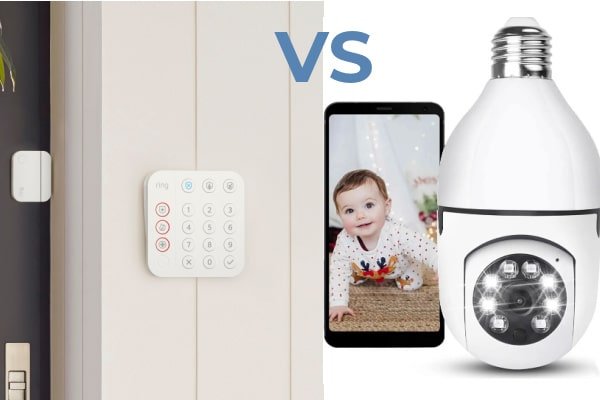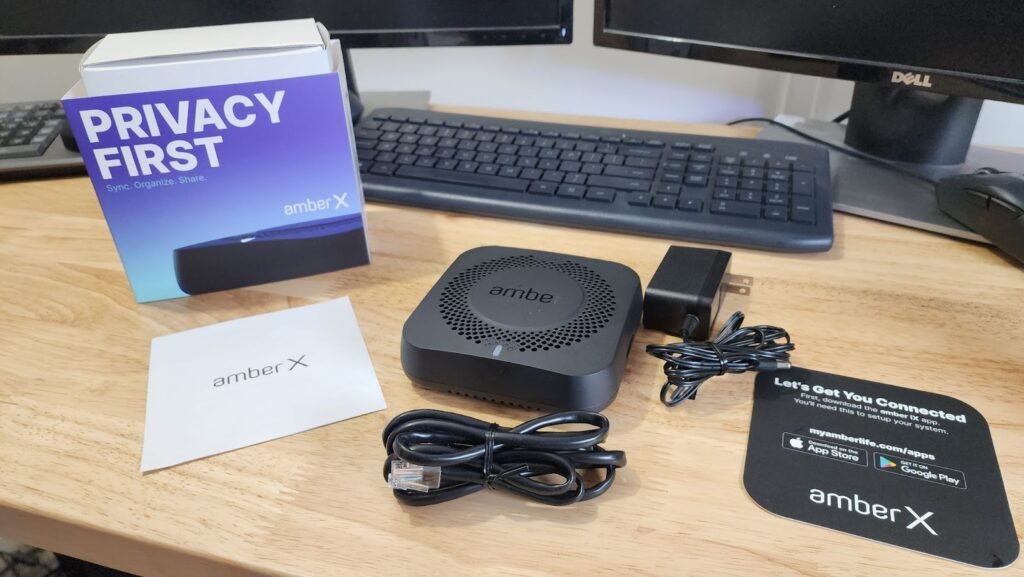Surveillance in today’s age of wireless connectivity is not limited to streets and places with security concerns. Different homes and businesses have started adapting the latest security systems to ensure safety and surveillance in real-time. I bet 80% of the homes in my neighborhood have some kind of home security setup.
Presently, the number of options is expanding regarding monitoring devices for your home security. Some are amazing. Some are not. There are new and advanced approaches to your property protection with the light bulb security camera or a reliable, DIY solution with the Ring Home Security Alarm. Before choosing the right security system, you need to look at all the characteristics, features, and security options these systems provide. We wanted to briefly see how both these options stack up against each other.
What We Know About Light Bulb Security Cameras
As the name suggests, a light bulb security camera enables installing the security camera as simple as screwing in a lightbulb. You can utilize these light bulb security cameras with Wi-Fi and a compatible smartphone. A light bulb security camera is convenient and inexpensive, making it an excellent option for budget-conscious homeowners.
For instance, a WiFi Light Bulb Camera covers 360-degree horizontal and 90-degree vertical movement, helping it avoid dead corners. It also works well for both in-home and outdoor coverage since it alerts you if someone tries to enter your home, thanks to its motion detection. In a nutshell, light bulb security cameras are super easy and super quick for home security.
What We Know About Ring Home Security
Ring security has evolved since it made its first security doorbell around eight years ago. Thanks to these developments, Ring Home Security now offers both innovative and reliable security systems. With the Ring Alarm 5-Piece Kit + video doorbell combo, you can view live video from the doorbell camera and get in-depth smartphone notifications.
TRENDING: Our Home Security Light Bulb Camera Review
You can connect the monitoring system to your phone using your Wi-Fi network. Moreover, you can also use an Ethernet cable for your hub (if you have to). In my opinion, Ring is the best DIY home security option on the market.
Ring vs. Light Bulb Security Cameras
Self-Monitoring Support
Both Ring and light bulb security cameras offer compact security system kits that are a perfect fit for users that prefer self-monitoring. For example, Ring’s Alarm Security Kit contains contact sensors and motion detectors, while light bulb security cameras have motion detection, 360-degree angle coverage, and night vision. Each has its own apps that users can take advantage of to get the full effect of self-monitoring. However, I’d give Ring the advantage because their app comes with more features, more customization, the system is IFTTT enabled, and I love the Neighbors feature to keep me informed on what’s happening in my community.
Winner: Ring Home Security
READ MORE: Best IFTTT Home Security Systems
Ease of Installation
Both Ring and light bulb Security Cameras are great options for home security systems that are easy to install and set up. They do not require you to be tech-savvy or have in-depth knowledge of electronics to set up. Ring alarm systems equipment mostly uses double-sided tape. As for the light bulb security camera, it can screw in a bulb socket with no extra wiring.
LEARN MORE: Ring Video Doorbell Tips And Tricks
Now, I also consider installing the app and configuring it to your technology as part of the installation process. You will not find an easier setup/install process as you do with Ring. Just from what I’ve researched (I’m a member of their Deep Dive team, which means I get products from them to beta test and offer feature suggestions), Ring puts a ton of research and development into their app. Are the light bulbs easier to install vs Ring’s 5-piece home security kit? Well…yeah. It’s literally as easy as screwing in a light bulb (no jokes either). However, considering the simplicity of installing and setting up the Ring kit…this one is a toss-up.
Winner: Tie
Wireless Connectivity
Both Ring and the light bulb security camera have wireless connectivity, requiring a Wi-Fi connection and router to operate. Ring relies on the Z-Wave wireless protocol for connectivity, which is more robust and provides a better range. On the other hand, a light bulb security camera supports different Wi-Fi connectivity depending on the product. Some support standard 2.4Ghz Wi-Fi, while others can support 5Ghz Wi-Fi.
RELATED: Here’s A Crash Course In Home Automation Basics
I’ve never run into any connectivity issues with either of these products, but when you consider Ring’s DIY home security kit comes with 5 pieces of tech (and in some cases more if you get more add-ons), the level of complexity compared to one light bulb being screwed in…is hardly comparable.
Winner: Ring Home Security
Cloud and Local Storage Support
Ring uses the cloud to store data and has no option for local storage. This can be a concern if you face connectivity issues (which are far and few between), but Ring also provides a pro plan that features a cellular backup connection.
A light bulb security camera supports both cloud and local memory storage options. It provides more security as you can store the data offline on a small SD card (with most models). This is one feature I wish Ring would support
Winner: Light Bulb Cameras
Home Security Coverage
A light bulb security camera leaves no loose ends because of its 360-degree angle coverage. On the other hand, Ring Home Security uses a mount and fix coverage approach. In theory, you could place a light bulb security camera in as many sockets as you have. But…you’re limited by how many sockets AND where those sockets are strategically placed on your property. Furthermore, whereas many of these light bulb security cameras don’t come with LED lights to actually light up your property, you’re at a disadvantage with coverage. I love the coverage options when it comes to Ring. Windows, motion sensors, cameras, doorbells…you can’t even compare coverage when it comes to Ring.
Winner: Ring Home Security
Home Security Add-ons
A light bulb security camera is one purpose for all, with varying specifications in terms of resolution, memory, and night vision. To be fair, its entire premise is built on that. Down the road when these home security devices gain in popularity, we might see add-ons. On the other hand, Ring security systems are designed to support various add-ons like sensors and other devices to enhance your system further. As popular as these lightbulb security cameras are, I wouldn’t be surprised if this is a product-niche they get their hands in.
Winner: Ring Home Security
Legalities
Both of these security systems approach methods of surveillance differently. A light bulb security camera is built to disguise it as a light bulb. It’s a little more discreet. Though such hidden cameras for home security are legal in many states, some still have varying laws depending on the location. It is best to confirm your state law before going for the light bulb security camera. Ring Security System does not have these legalities.
Winner: Ring Home Security
Ring vs. Light Bulb Security Cameras: The Prices
Prices for both Ring and light bulb security cameras vary depending on the features you are aiming to get. Going with the Security Kit for your first set-up of Ring Home Security is a great option. It includes the 5-Piece Alarm Security Kit, which will cost around $199. That’s around $40 per device with this setup. I’d also point out that the Ring doorbell camera (that doesn’t come with the basic Ring kit) will run you about $99.
Light bulb security cameras range from $14 to $200, depending on network connectivity, night vision, and resolution features. Most decent light bulb security cameras will run you anywhere from $30-$40 per unit to start. In terms of price comparison, there’s not much difference there.
Winner: Tie
Ring vs Light Bulb Home Security: The Verdict
Many options for monitoring your home security are available today. I’m shocked at how far the industry has evolved in just the last several years. It’s encouraging and I welcome all of it. Depending on your preference, you can select an innovative and reliable DIY self-monitoring system with the Ring Home Security or a more inconspicuous, cost-effective choice with the light bulb security camera. Both offer advantages for the home automation sector and are unique in their functionality, allowing you to choose the best option depending upon your preference.
DISCOVER: Home Automation? What Is That? We Answer That And More!
When it comes to affordable and effective, DIY home security I have to give a strong nod to Ring home security. I’m a huge fan of smart home automation and how home security integrates with that ecosystem of all the gadgets and devices in the home. While you can still integrate these smart light bulbs into your home automation, there’s another dimension of security that Ring offers that these smart light bulbs can’t.








